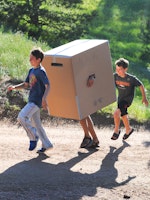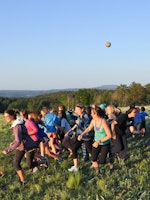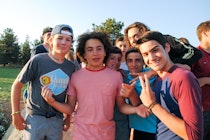Free Play
Closely associated with the research supporting the importance of a connection with the natural world for children, is a growing body of research which indicates that the shift away from unstructured outdoor play is detrimental to healthy child development.
The research suggests that free play—especially in nature—is essential to cognitive, physical, social, and emotional development. Play is linked to growth in memory, self-regulation, oral language, and recognizing symbols. It is linked to higher levels of school adjustment and increased social development as well as to increased literacy skills.


Free play happens when children create their own agenda and play together undirected by adults. This kind of play is more likely to occur in the natural world because there are so many variables to stimulate creativity and discovery. Camp is an ideal setting for free play because, while many activities are organized and directed by counselors, there are times each day when young people can explore together and create imaginative scenarios while the adults either watch over them or actively engage in the child-driven play.

There are an astonishingly large number of stick huts spread through the forests of camp, all built by groups of campers who imagined that they were pioneers, cowboys or alien beings. There are any number of rudimentary dams on our small streams, built by campers who diverted the water just to see what would happen. The woods here are a safe place to play—no snakes, poison ivy or outsiders. And, given a safe place to play and the time to let their imaginations roam, children invent a truly wonderful array of new games and new worlds.
This play helps children develop many social and emotional skills; they learn to be fair and take turns by interacting with their peers. They learn to communicate and to accommodate others’ desires. Research suggests that play promotes neural development in brain areas involved in emotional reactions and social learning


Play is also critical for emotional health, possibly because it helps kids work through anxiety and stress. And, studies indicate that play actually makes kids smarter and more creative. The Serious Need for Play, an article in the January, 2009, Scientific American cites example after example of research demonstrating the creativity children demonstrate when in free play situations.
At camp, the community of peers and nurturing adults, the natural setting, and the time provide multiple opportunities for free play. As Tufts University child development expert David Elkind says “Play has to be reframed and seen not as an opposite to work but a complement. Curiosity, imagination and creativity are like muscles: if you don’t use them, you lose them.”